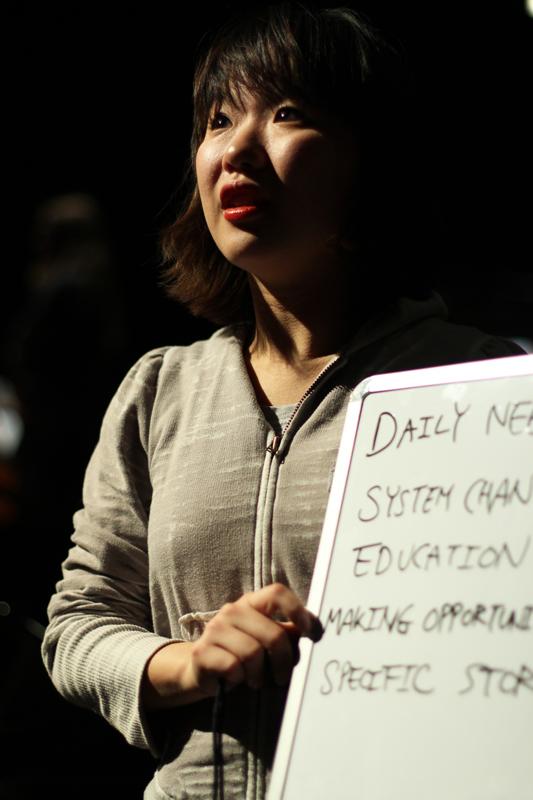“How to End Poverty in 90 Minutes (with 199 people you may or may not know)” lets the audience choose its own adventure. With $1,000 in cash sitting onstage, viewers vote at the end of the show to decide how the money from ticket sales should be spent. Created by director and Northwestern professor Michael Rohd, the production is part of the Theatre and Interpretation Center’s 32nd season, which features a number of shows focusing on poverty.
“I think that public spaces and public opportunities for safe, imaginative, productive dialog around issues of public and social concern are extremely rare in U.S. society today,” Rohd said. “I think that the arts and theater in particular offer an amazing and very useful opportunity for people to come together and be in conversation with each other.”
To facilitate that conversation, the show is about 65 percent written and scripted material and 35 percent audience participation, in which viewers talk about the issue of poverty in small and large groups organized by the cast. Ensemble members said by leaving such a significant segment of the show up to the audience, they also left an opportunity for one-off experiences.
“We want every show to be different, we want every conversation to be unique,” said Samuel Zeisel, an ensemble member and Communication junior. “If we’re able to relax and not really think of it as a performance, but more think of it as a rare conversation with people we don’t know, I think that we’ll begin to find that it’s a whole lot of fun.”
The ensemble has worked with a number of test audiences, including people from across the country who attended the Global Engagement Summit at NU. This variety has helped Rohd, the 16 ensemble members and other students involved refine the material.
“We learned things from running test audiences through the process, and we absolutely continue to adjust and learn and make changes, particularly in the participatory section,” Rohd said.
For the scripted part of the show, Rohd worked with the student ensemble members, most of whom took a Fall Quarter course on poverty research to inform their writing.
“One of the advantages of making new work at a university is you get to bring a team of artists together, students and professionals, and you get to spend a lot of time learning about the subject matter,” Rohd said. “Students don’t just rise to whatever bar we can set — they create a new bar. They’re just fantastic collaborators.”
The class consisted of lots of reading and research, along with guest speakers who discussed specific aspects of poverty, such as food prices or housing. Zeisel said the class allowed everyone in the production to have a “common vocabulary.”
“There’s so much surrounding these issues, and we wanted to come at it with as much humility as possible,” Zeisel said. “It allowed us to feel like we could at least begin to ask the right questions.”
Rohd created an outline of the show, and the final product was written during rehearsals in April and May, said Communication junior Daphne Kim, an ensemble member. The process was non-traditional, with some parts of the show written in small groups, some parts written by Rohd and others born out of improvised scenes.
When writing the show, Rohd said the team made sure there was not a specific message embedded in the production. He said he encourages anyone who attends the performance to come in with an open mind.
“I hope that potential audience members in the NU community don’t turn away because they assume it has something to say and they either already know what it is or they don’t agree with it,” Rohd said. “I hope folks will consider bringing their background and perspective to the conversation.”
Zeisel said the show provides an opportunity to break past surface-level discussion and encourage audience members to ask hard questions.
“I would love to have an experience in dialogue and conversation that they don’t usually have,” Zeisel said. “We don’t usually get to have these types of conversations with anybody, let alone a stranger.”
“How to End Poverty” also gives people the chance to have a meaningful, face-to-face conversation, something Kim said she believes is particularly important.
“I think that theater’s one of the last things that forces people to be in a room together in the flesh in this age of online and virtual communication,” Kim said. “Our show is so contingent on people not just watching something but being an active part of it.
Combining a theater production with global issues was one of the reasons Kim auditioned for “How to End Poverty.” The Communication junior, who was involved in the sexual violence ENU, said she wanted to continue participating in productions that raise important issues.
“Linking theater to something that is so urgent and universal as the issue of poverty feels really meaningful to me,” Kim said. “I think that as a politician would with the power of decision-making, we as artists have to be conscious of how what (we) put on stage (impacts) the world.”

